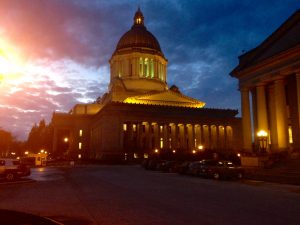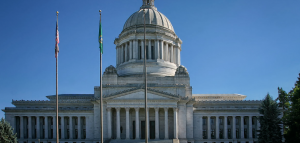Things move quickly in a short, 60-day session and this year was no different. The 2022 Washington State Legislature began January 10th and concluded March 10th. Aside from being the first-ever fully virtual legislative biennium, the 2021 – 2022 legislative sessions resulted in the largest biennial budget in state history paid for in large part from existing tax collections and more than $1 billion in federal COVID-19 relief money.
Because the Legislature works within a two-year cycle, the shorter session is primarily focused addressing unfinished business from the year before, refining the two-year budget and responding to any new crises. The first rule of a short session is to “do no harm” and that was upheld for forest landowners. Many of the forestry-related bills listed below did not pass, but all offer a little insight on the place forestry held in minds of legislators.

Capitol dome at sunset.
HB 1895/SB 5633: Keep Washington Evergreen – DID NOT PASS
The Washington State Department of Natural Resources (DNR) envisioned a planning process to conserve one million acres of “working and non-working” forestland, replant one million acres of new forests, and conduct one million acres of forest health work. The bill would have commissioned a process at the DNR to chart a path toward those outcomes. But an effort to re-write the bill into one unfavorable toward working forests stalled in the Legislature, and the bill was pronounced dead by Commissioner of Public Lands Hilary Franz herself.
SB 5961: Biochar – PASSED
SB 5961 is the only forestry-related bill that passed this session. It aims to prioritize the use of biochar in public works planning. Specifically, it requires all state agencies and local governments to “consider whether biochar can be used” in public works projects.
SB 5693: Operating Budget
- Forest Riparian Easement Program: PASSED. Forest Riparian Easement Program (FREP) received an additional $5 million investment. The FREP was created more than 20 years ago as part of the Forests and Fish Law to partially offset regulatory costs for small forest landowners and has been chronically underfunded since. This proposal first appeared in the Senate version of the budget and was the brainchild of the lead budget writer, Sen. Christine Rolfes (D-Bainbridge Island) and championed by State Rep. Mike Chapman (D-Port Angeles) in the House.
- Adaptive Management Audit: PASSED. The DNR requested funding from the Legislature to implement agreed to recommendations of a State Auditor’s report on the adaptive management program. The Governor’s proposed budget funded this work, and the House matched the funding. The Senate, however, directed the agency to implement recommendations from the audit but didn’t give them extra resources to complete the work. In the end, the Senate position prevailed, meaning that the DNR must do the work “within existing resources.”
- Wildfire Administration Costs: PASSED. DNR’s wildfire program has operated under a recurring budget proviso that prohibits it from covering the administrative expenses of its wildfire program with its wildfire appropriation. This means that all other DNR programs and DNR-managed accounts must subsidize the administrative overhead of the fire program. For forest landowners, that means a small portion of the direct funding provided by landowners for forest fire assessments and the Forest and Fish B&O surcharge are used to cover this expense and not for their intended purposes. The DNR has been asking for a few years to have this prohibition lifted and this session it happened.
HB 2078: Outdoor Education – PASSED
This bill – offered by Rep. Alicia Rule (D-Blaine) and supported by the Pacific Education Institute – creates an outdoor learning grant program that connects public and tribal school students with the state’s various natural resource agencies to provide relevant expertise on land management and work-integrated learning experiences.
SB 5637: Forest Practices Fees – DID NOT PASS
The bill proposed to raise forest practices application fees to pay for both the second half of a DNR-requested $4 million IT investment and the significant ongoing maintenance costs for the system. Opponents of the bill successfully made the case that the value of a new permitting system belonged to the state and not the permittees and any investment made in the state’s own proprietary systems should be paid for by the state alone.
SB 5411: Safe Harbor Agreements for Northern Spotted Owls – DID NOT PASS
Last session, DNR requested express authority to create a program to allow landowners to voluntarily enter into a safe harbor agreement for the Northern spotted owl. The bill was scheduled on the floor calendar this session for final passage but failed to be called for a vote before the deadline. This is a common fate of many bills and often speaks to priorities and timing as opposed to anything flawed with the bill. That said, the outcome is that it still didn’t pass.
HB 1838: Promoting Salmon Recovery – DID NOT PASS
This was the Governor’s signature salmon recovery proposal. Called the “Lorraine Loomis Act” in honor of the recently deceased tribal leader, the bill primarily focused on new riparian buffer requirements using a priority mapping system to be developed by the state and tribes. The bill was swiftly put down without a single vote due in large part to criticism that it lacked collaboration and input from stakeholders during its development. The bill itself exempted forestry, but it is worth mentioning since numerous tribal and environmental leaders cited forestry and Forest and Fish Law as a model that is working.

Washington State Legislative Building.
HB 2093/SB 5921: Administrative Costs of the Timber Tax Program – DID NOT PASS
These companion bills were drafted to address an issue related to how much overhead the Department of Revenue charges to collect the timber harvest excise tax in Lewis County. Specifically, it would have lowered the state administrative overhead to only 2% and created an expectation that the state general fund would cover any additional costs. In the end, the bill was put down in favor of interim discussions on the topic.
Looking ahead, all 98 members of the House, one half of the Senate, and an odd off-year retention election for Secretary of State Steve Hobbs will be on the November ballot. Currently, the Legislature has a total 24 seats open seats due to retirements and a few lawmakers pursuing other elected offices. More announcements could happen before filing week in May. This is also the first election with the new (and yet fully finalized) post-redistricting legislative district maps. The majority in both chambers will again be in play.
